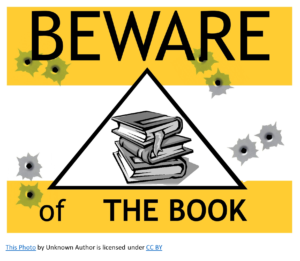In Defense of Diverse Points of View
Texas used to be known as the home of tough-guy cowboys. Now it seems like a state that is shaking in its cowboy boots if anyone wants to offer a perspective different than the white heterosexual male Christian one. As a writer, history major and parent of two, I find this trend chilling.
Yesterday, Governor Abbott introduced plans for a new “Parental Bill of Rights” which sounds fine on its surface, but when you look deeper you’ll find that one of the things he is trying to do is ban books from schools that discuss LGBTQ perspectives and punish teachers who teach it with a $4,000 fine and up to a year in jail. Here’s the quote:
In a letter to the Texas Education Agency he referenced Maia Kobabe’s “Gender Queer: A Memoir” and Carmen Maria Machado’s “In the Dream House” which deal with same-sex relationships and are recommended for high school-aged readers. According to Gallup News, 5.6% of the population identifies as lesbian, gay, bisexual or transgender. Shouldn’t those students be allowed to read stories about their own experiences? It helps them realize that they are not alone. These stories give straight kids the chance to better understand their peers. In our current environment a little bit of empathy goes a long way.“Under this plan, Texas will also ensure that any educational personnel convicted of providing minors with pornographic materials will lose all their educational credentials and state licensing, plus forfeit their retirement benefits and be placed on the do not hire list.” (link: The Hill)
Last year the governor signed two bills into law that banned teachers from teaching about critical race theory, which, by the way, was never taught in K-12 schools because its something taught in graduate school. The idea is that students shouldn’t discuss racism in our country because it makes white students feel bad/guilty. Some white parents feel that race shouldn’t be mentioned in elementary school. But if you’re a Black kid, you don’t have a choice. The reality is that our country isn’t perfect (no country is) but if you want to fix things you have to first acknowledge facts.
The fact is back in 1619 when the first enslaved people from Africa arrived, rich Englishmen in Virginia realized that they could profit off forced labor, so they created laws to benefit themselves and oppress people based on the color of their skin. Slave Codes weren’t just a southern thing either, slavery existed in all the colonies and the laws put in place were designed to dehumanize an entire population. Even after the Civil War new laws were put into place to keep Black people from gaining access to equal education, housing, business loans and voting, despite the fact they were now US citizens.
When I went to school I learned that slavery was the nation’s original sin but the Civil War fixed it and Martin Luther King Jr. gave his “I Have A Dream” speech and we’re all equal now, the end. Well that leaves a lot of gaps, doesn’t it?
I remember going to college and taking an American history class taught by a Latino man and he said, “America had Native Americans, Europeans and Africans all merging and we’re going to learn about that clash.” Finally! I’d get to learn the truth. The real story. But no, after chapter 1 it went back to the default of what the presidents and congress did. Yes, obviously that’s important, but I thirsted for information about everyone else. Where were the women? How did Mexicans feel about joining the union? When did Asian Americans really get to vote? Why is this information kept out of our history or only listed as a footnote or sideline?
The goal of education is to inspire people to get curious and seek answers. How can our Texas students get an accurate sense of who we are as a nation if teachers are terrified to teach anything other than the white male hetero Christian perspective for fear of punishment and loss of employment? How un-American can you get?
Another goal of schools is to prepare our children to become business leaders. Businesses are looking for diverse teams who can provide perspectives from multiple angles. Why? Because they make more money and deliver better results.
“A 2017 Boston Consulting Group (BCG) study identified diversity as a key driver of innovation, finding that diverse teams produce 19% more revenue.” (Forbes)
That same study showed:
• Inclusive teams make better business decisions up to 87% of the time.
• Teams that follow an inclusive process make decisions twice as fast with half the meetings.
• Decisions made and executed by diverse teams delivered 60% better results.
There are other benefits to having students study different points of view. With respect to conflict resolution, David W. Johnson Ed.D. in Psychology Today writes that taking another person’s perspective is vital because without the ability to do so, “his or her understanding of the issue is limited and incomplete.”
America’s biggest strength is our diversity. Our students deserve access to learn about the good the bad and the ugly of our history and shared cultures so they can move forward with the goal to make a more perfect union. Don’t be afraid of books, Texas!
